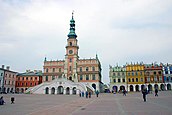Portal:Poland/Selected article/29
The history of the Polish–Lithuanian Commonwealth from 1569 to 1648 covers a period of Poland's rise and expansion, before it was subjected to devastating wars in the middle of the 17th century. The Union of Lublin of 1569 established the Polish–Lithuanian Commonwealth, a federal state replacing the previous dynastic union of the two nations. The Commonwealth was run by the nobility, through a system of a central parliament and local assemblies, under elected kings. It was a period of Poland's great power, civilizational advancement and prosperity. The Commonwealth had become an influential player in Europe, spreading the Western culture eastward. The Warsaw Confederation of 1573 was the culmination of religious toleration that was unique in Europe, but the Catholic Church soon embarked on an ideological counter-offensive, while the Union of Brest split the Eastern Christians within the Commonwealth. The Commonwealth fought mostly successful wars with Russia, Sweden and the Ottoman Empire, but it gradually became a playground of internal conflicts, in which kings, powerful magnates and factions of nobility were the main actors. (Full article...)

